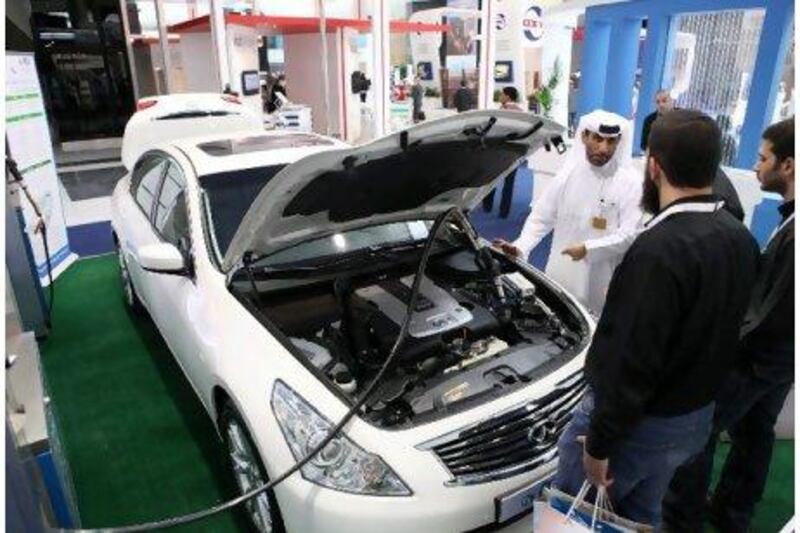ABU DHABI // Adnoc plans to convert more than 500 public vehicles and taxis to natural gas by next year as part of an initiative to reduce air pollution in the capital.
A total of 117 vehicles have already undergone the conversion. The company is currently converting, at no charge, 25 Abu Dhabi Company for Offshore Oil Operations (Adco) cars and more than 79 taxis.
Adnoc officials said that the service was available only to public vehicles and taxis, however private cars would soon be eligible to convert their cars to natural gas.
Going green could save motorists up to 50 per cent on refuelling, according to transport officials.
"If you currently spend Dh100 on refilling your car, you could only pay Dh50 for the same distance by converting to natural gas," said Maher al Rafai, the director of the natural gas vehicle conversion centre at Emirates Transport, a federal corporation owned wholly by the Government.
According to the International Association for Natural Gas Vehicles (NGV Global), in its pure form natural gas is colourless, odourless, non-toxic and lighter than air.
Comprised mostly of methane, natural gas is second only to hydrogen in emitting very low levels of carbon dioxide when burned. Natural gas reduces carbon emissions by 25 per cent, carbon dioxide by 80 per cent and nitrogen by 60 per cent, according to figures provided by Emirates Transport, which provides workshops for car conversion.
Natural gas also has a narrow flammability range, making it a safer fossil fuel than other alternatives. Unlike petrol, which pools on the ground and creates a fire hazard in the event of an accident, compressed natural gas (CNG) readily dissipates into the air. Natural gas also has a high ignition temperature, about 600°C, compared to about 315°C for petrol.
The UAE possesses the fifth-largest natural gas reserves in the world, and at the current rate of utilisation these reserves will last for more than 150 years.
Two CNG conversion centres, in Al Manaseer and Al Dhafra, have officially opened and preparations to open centres in Khalifa City A and Al Ain are also complete. A conversion centre is also planned for Sharjah. There are 17 natural gas pumps across the UAE, including 11 in Abu Dhabi, two in Al Ain and four in Sharjah.
According to Emirates Transport, conversion costs vary depending on engine size. Converting a four-cylinder car would cost Dh7,400, while a six-cylinder car would cost Dh8,000 and eight cylinders would be Dh9,300. However, only smaller vehicles can be converted at the moment.
Officials said that converting to CNG also made economical sense. In addition to lower fuel costs, maintenance costs are also reduced, since CNG is generally a cleaner gas and therefore preserves the life of the engine. Mr al Rafai said that motorists could recover their initial conversion costs within eight to nine months.
According to NGV Global, natural gas vehicle numbers around the world have more than doubled in the past five years. There are currently more than 12 million natural gas vehicles worldwide and NGV Global projects that this will increase at least ten-fold to 50 million vehicles by 2020.
In addition to being used as an alternative to petrol for motor vehicles, long-term plans in Abu Dhabi include using natural gas as a replacement for liquid petroleum gas in cooking, as well as an alternative for electricity for heating and cooling.





